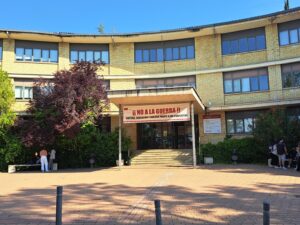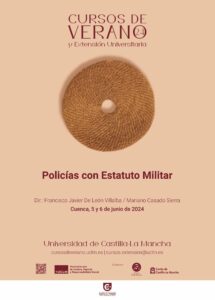Seminar on Military-Status Police Officers – Spain, 5-6 June
7 June 2024
 On 5-6 June 2024, the University of Castilla-La Mancha (UCLM) hosted a seminar titled “Policías con Estatuto Militar” (Police Officers with Military Status). This event provided a platform to explore the unique legal, operational, and historical aspects of police forces operating under a military framework. Key speakers included representatives from among others EUROMIL, EuroCOP, AUME, and AUGC.
On 5-6 June 2024, the University of Castilla-La Mancha (UCLM) hosted a seminar titled “Policías con Estatuto Militar” (Police Officers with Military Status). This event provided a platform to explore the unique legal, operational, and historical aspects of police forces operating under a military framework. Key speakers included representatives from among others EUROMIL, EuroCOP, AUME, and AUGC.
The Subdelegate of the Government of Spain in Cuenca, Ms Luz Fernández, and the Vice-Rector of the University of Castilla-La Mancha (UCLM), César Sánchez, have inaugurated the course The course’s objective was to provide a comparative and national legal perspective on the status of these police bodies within the European context. Other key participants in the inauguration included Lieutenant Colonel María Jesús Pascual, head of the Cuenca Guardia Civil Command, and the course director, Francisco Javier de León, a professor of Criminal Law and director of the Chair of Justice and Prison. We must also extend our deepest appreciation to Mr Mariano Casado Sierra, President of the Observatory of Military Life, for his exceptional leadership, and to Ms María José Pignatelli García, Researcher in Criminal Law, for her meticulous work organizing this conference. Their significant contributions in collaboration with Professor Francisco Javier de León were instrumental in the successful conduct and organization of the conference.
On the first day, EUROMIL’s President Emmanuel Jacob opened the conference, after the introduction by Mariano Casado, and highlighted the organization’s mission to promote the professional and social interests as well as the fundamental rights and freedoms of European soldiers. He emphasized the importance of the “Citizen in Uniform” concept, which underlines the principle of equal rights and treatment for military personnel. Overall, the presentation emphasized the crucial role of EUROMIL in advocating for the rights and welfare of military personnel across Europe, promoting a more inclusive and equitable environment for soldiers.
Furthermore, his presentation highlighted the importance of promoting equal rights and treatment for soldiers, empowering them to form and join trade unions, and ensuring their inclusion in social and labor legislation. Notably, EUROMIL advocates for regular social dialogue to address existing restrictions on soldiers’ rights, aiming to foster a fair and just working environment.
The session also covered the structure and operations of police forces with military status in various European countries, such as the National Gendarmerie in France, the Carabinieri in Italy, The Marechaussee in the Netherlands, and the Guardia Civil in Spain. These forces blend military discipline with police duties, effectively addressing public security challenges.
Further discussions included the European Social Charter, which guarantees essential social and economic rights and includes mechanisms for monitoring compliance through national reports and collective complaints procedures. EUROMIL actively engages in these procedures, addressing violations of charter provisions concerning military personnel. Additionally, the presentation touched upon relevant cases from the European Court of Human Rights and the European Court of Justice, underscoring the balance between national security interests and the fundamental rights of military personnel.
The first day’s panel discussions revealed that police officers with military status face a unique set of challenges due to their dual roles. This often leads to confusion regarding their rights and obligations, as they are sometimes treated as soldiers and at other times as police officers. This duality can complicate their professional lives, impacting their legal protections and operational responsibilities. “Military-status police officers often find themselves in a complex ‘grey zone’ regarding their rights and duties, being viewed as soldiers in some contexts and as police officers in others” Mr Jacob said. “This ambiguity creates significant challenges in terms of legal protections and operational directives” he continued.
Representatives from AUME and AUGC joined President Jacob in emphasizing the importance of addressing these challenges. They discussed the historical evolution of military-status police forces, providing comparative international perspectives and highlighting contemporary issues faced by these entities.
Looking ahead, EUROMIL aims to maintain the momentum generated by this seminar. The organization plans to engage further in collaboration with its members in Spain and the Netherlands, fostering more in-depth discussions and collaborative efforts to address the identified challenges. By connecting with affected officers and stakeholders, EUROMIL hopes to develop comprehensive strategies that enhance the professional lives of military-status police officers, ensuring their duties and rights are well-balanced and respected.
For more information, visit the UCLM events page.

